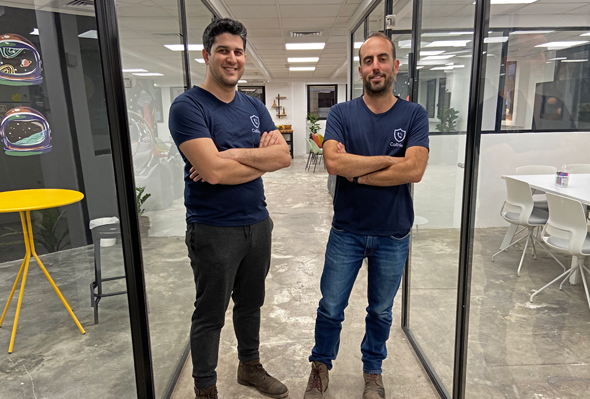Truecaller acquires Israeli phone call verification tool CallHero for $6.5 million
CallHero’s headquarters in Israel will be transformed into Truecaller’s local cloud telephony department and R&D center
10:0919.01.22
Truecaller, a platform to help verify contacts and block unwanted telephone communications, has acquired Israeli company CallHero for $6.5 million in cash and stock. CallHero’s solution for Android and iPhone can help users verify and answer calls with the help of a smart digital assistant. It is understood that the CallHero headquarters in Israel will be transformed into Trucaller’s local cloud telephony department and R&D center as it expands its offering and tools to its 300 million users.
 CallHero founders Raphael Mimoun and Roy Festinger. Photo: CallHero
CallHero founders Raphael Mimoun and Roy Festinger. Photo: CallHero
“Our emails are well protected - If you send me obvious spam, I will never see it,” explained Raphael Mimoun, CEO of CallHero (now Truecaller Israel) on a call with CTech. “Google's filters are so well trained by now, it’s very hard to get past them. Email is almost solved, but what about phone calls? This is much more intrusive, in my opinion.”
 CallHero founders Raphael Mimoun and Roy Festinger. Photo: CallHero
CallHero founders Raphael Mimoun and Roy Festinger. Photo: CallHero CallHero was founded in 2019 by Mimoun and Roy Festinger to ease the burden of incoming calls with the use of AI. Truecaller, founded in 2009 in Sweden, features caller-identification, call-blocking, flash messaging, and call-recording tools. It is a ‘freemium’ service initially offered for free to use and it is understood that CallHero will be incorporated into its premium features.
Truecaller also has the ability to insert a cellphone number into its database and show the name and location of that user. This journalist found his information posted on the site without his consent ahead of the call with no clear way to remove it. In essence, identities associated with telephone numbers are posted online and its services help block unsolicited calls associated with that consequence.
Related Stories:
- “Tech giants now have corporate responsibility similar to that of state entities”
- “We’re on it.” SAP addresses privacy efforts during the holiday season
- Google Cloud affirms its commitment to privacy and security at Tech TLV
“The idea of CallHero is to be able to have some sort of firewall around your number and if you have my number it doesn't mean you can just call me,” Mimoun explained. The duo is new to Truecaller and could not comment on its practices, but assured that the company abides by local and international privacy laws. “If you have my number and I don’t have you in my contact, I won’t see it, it won’t appear. It will only be in the spam folder on Callhero unless you explain why you called and I agreed to it. This is a more privacy-focused world, and this is a must for phone calls.”
Alan Mamedi, CEO and co-founder of Truecaller, added via a statement: “CallHero gives the user intelligent support in handling incoming calls with the help of an AI-based assistant who answers the call. The conversation between the caller and the assistant is visible in text-based format, live in the app. This service will help our users prioritize what is relevant and important without having to talk. The technology that CallHero has developed strengthens our offering in the U.S. much faster by integrating it into Truecaller, but our ambition is of course to roll out the service in all our markets. CallHero today has a well-developed advanced functionality for iPhone users, which is important in the western world, but also a valuable complement to our work to make Truecaller more efficient and user-friendly for both iPhone and Android users worldwide.”
Currently, CallHero is used primarily in the U.S and Canada, but integration into Truecaller’s 300 million-strong userbase is set to change that. Between January 1- October 31, 2021 alone, Truecaller identified and blocked 38 billion unwanted calls and has been listed on Nasdaq Stockholm since October 2021.



